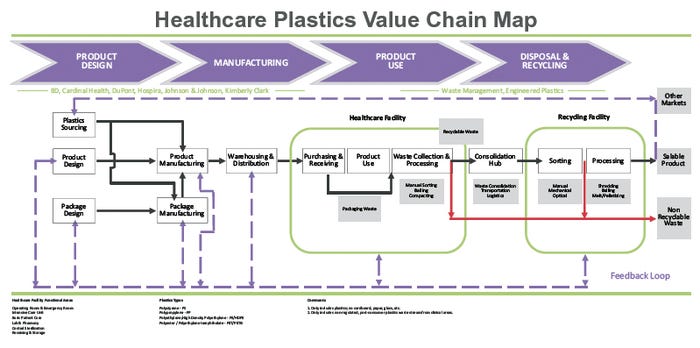Industry coalition takes on medical plastics recycling
A consortium of companies spanning healthcare, recycling, and waste management have banded together to address plastics recycling in the healthcare market, considering the issue from product design and manufacturing through product use, disposal, and reclaim. The Healthcare Plastics Recycling Council (HPRC), which draws members from medical and waste luminaries such as Becton Dickinson and Co.
April 11, 2011
A consortium of companies spanning healthcare, recycling, and waste management have banded together to address plastics recycling in the healthcare market, considering the issue from product design and manufacturing through product use, disposal, and reclaim. The Healthcare Plastics Recycling Council (HPRC), which draws members from medical and waste luminaries such as Becton Dickinson and Co. Cardinal Health, Engineered Plastics, DuPont, Hospira, Johnson & Johnson, Kimberly Clark, and Waste Management, describes itself as "a technical coalition seeking to inspire and enable sustainable, cost-effective recycling solutions for plastic products and materials used in the delivery of healthcare."
At this time, the coalition is tackling three primary initiatives. The first initiative, healthcare plastics value-chain mapping, will define the healthcare value chain and identify issues and barriers along the value chain that disable plastics recycling. The second initiative, design for recycling guidelines, focuses on developing a document that articulates product and packaging design considerations that could enhance recycling potential and value. The third initiative, pilot study programs within healthcare facilities, will build a data model to facilitate economic analysis of plastics recycling.
Healthcare plastics recycling.
The council will convene biannually at meetings hosted by an HPRC member that include facility tours to further knowledge sharing through first-hand demonstration of best practices in sustainable product and packaging design and recycling processes.
Syringes, which are primarily plastic based, are a viable target for recycling, with industry research finding that they currently contribute the highest proportion of total medical plastic wastes. U.S. demand for medical plastics is forecast to reach $6.55 billion in 2012, growing to 4.4 billion lb on heightened concerns over infection control and increased use of disposable medical products and supplies, according to The Freedonia Group. Smaller-volume engineering plastics were set to outpace commodity plastics, with packaging to remain the largest and fastest growing market.
Globally, the medical plastics market is projected to exceed 10 billion lb by 2015, driven by biocompatibility, autoclavability, chemical resistance, transparency, and the ability to produce complex shapes, according to GIA. GIA's report also found that demand for plastics in medical devices would be fueled by its ability to produce low-weight medical devices.
About the Author(s)
You May Also Like


